Subscribe Apple | Google | Spotify | Stitcher | iHeart Living the Dream Overseas with Christine Gritmon Have you had a lifelong dream to live overseas and haven't made that happen yet? Maybe things have gotten in the way like family, jobs, life. My...
Ep83 Transcript: Interview with Bill Wittland
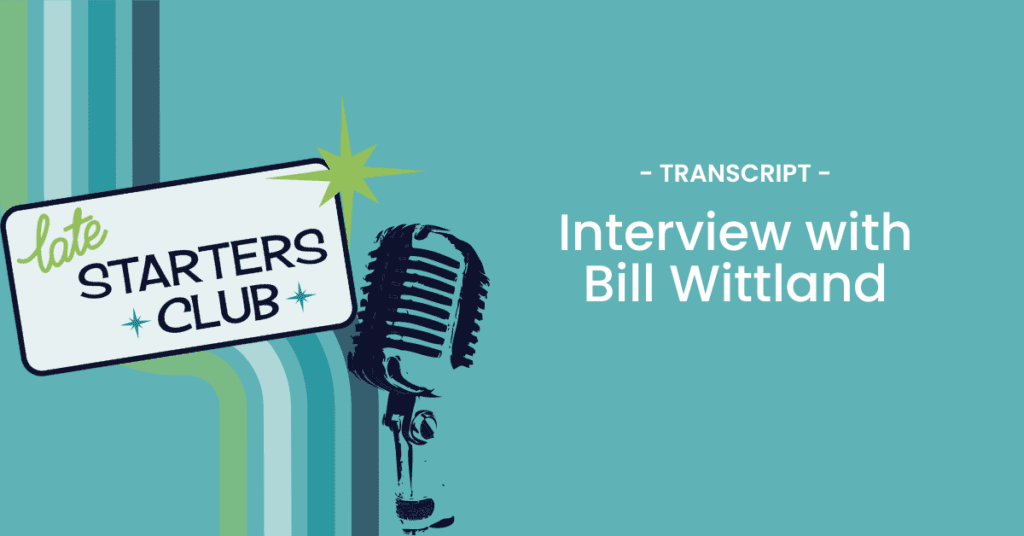
Andrea Vahl: What would you do if you have started a successful business and you’re now in your seventies and trying to decide what your next chapter might look like? Well, if you’re Bill Wittland, you might go back to school to the Inspired Leadership Initiative. Bill is a former priest turned entrepreneur who was trying to decide how to best serve his clients and what he was going to do with his next chapter.
Tune into today’s episode as we find out more about Bill’s journey.
Hello Dreamers. Welcome to the Late Starters Club, giving you the inspiration mindset and tools you need to start something midlife and beyond. Remember, it’s never too late to follow your dreams.
Hey, late starters, it’s your host, Andrea Vahl and I am here with Bill Wittland, a former priest who then had his journey into his own business and is now attending Notre Dame at the Inspired Leadership Initiative program.
And we are here to kind of find out how he came to that point later in life. So, welcome, Bill.
Bill Wittland: Thank you. Thank you, Andrea. It’s a pleasure to be with you.
Andrea Vahl: Yeah, great. And so we got connected through a mutual friend Emily, who is actually at Notre Dame running the program. And I’ve known her for years when they lived here out in Colorado.
And so it’s really fun to get to know you, but it’s kind of an interesting journey. You’ve had 10 years as a priest and then you decided to leave that phase and start something new. So I want to just spend a minute or two on how that decision came about and what it was like to transition from, you know, very different.
Bill Wittland: Sure, sure. It was it was obviously a major life decision. And one that I didn’t make lightly, as you can imagine. But what had happened for me is that my vocation as a priest had really been born of the post Vatican II Catholic Church that had an aspiration to make a big difference in the world.
And that is what propelled me forward in my work as a priest. And unfortunately, after a number of years doing that, it just became clear to me that the institution was going in one direction and I was going in another. And so I needed to make a change. I didn’t have the educational background to necessarily do something.
I had two master’s degrees in theology, so that doesn’t exactly equip you to jump into another career. But I was fortunate that I had done a lot of writing and conference speaking and things in my years as a priest. And there was a fellow at a marketing communications firm, Dennis Williams at the time, Williams Marketing Services, who said I think you could be a writer for us.
And he took a chance on me and it launched my career in business. And that led to making client relationships, working for other agencies, becoming a partner in agencies, those kinds of things. And then about probably almost 16 years ago, I decided that the kind of work I like to do the most.
Was the work that clients needed just from me. Not from big teams of people at the agency. And if you’re a partner at an agency, you need to generate work for big teams of people. And so, I decided to leave the agency world and just work on my own without employees, without a safety net of any kind either.
And I had a great, by that time in my career, I had a great network of clients. In those days, we called them Rolodexes because I had Rolodexes, but now it’s your online network. But I had great connections with people and I was able to create business opportunities and opportunities to help clients.
And I’ve been doing that and continuing to do that.
Andrea Vahl: Yeah. Yeah. So all of those, all of those jumps, those leaps into that unknown must have been kind of scary going from. You know, such a different vocation into into an agency and then agency to self-employed. That’s, those are scary leaps right there.
Bill Wittland: Yeah, they were. But as you know, they only happen when you’ve got a community of people around you who are supportive and that you believe will help you navigate the uncertainty and the fear of those kinds of things. And it does, it does feel at times like you’re jumping off a diving board and you can’t see how far down the water is, but you know.
Andrea Vahl: Yeah. Well, good. Well, I’m glad you did not belly flop or anything like that to continue that analogy landed, landed smoothly. So that’s really awesome. And I love you had said in your kind of, background information about the, you know, at the core really being a writer. And I can see how that can be the common thread between all of that.
And I think some of this is about finding that common thread, which is really what where your talents lie and writing sermons can be similar to writing in other ways, right?
Bill Wittland: Oh, it’s very true. And that’s what I kind of got in touch with was my ability to articulate things to either be creative or to be kind of, structured and linear.
I mean, there were elements where I had to kind of summon both of those skill sets to be someone who could take a kind of disjointed mess of ideas and create a narrative thread that made sense for a sales presentation or for any other kind of setting. And then there were times where you kind of had to abandon that linear left brain model and get creative and make some headlines and uhhuh and find a hook for a message. And so it was always that skill that kind of was at the core of what I could deliver to clients over the years. And it’s what I continued to nurture now.
Andrea Vahl: That’s, that’s awesome.
That’s awesome. So now let’s talk about your decision to kind of, you know, later in life you’ve got your own business, it’s going along great. You’ve got, you know, clients in a, you know, whatever. Now we call it CRM, right? Or it’s not roladex anymore, but you got, you’ve got clients that you work with.
What? What brought you to going back to a program and something kind of formal, like Notre Dame’s program?
Bill Wittland: A couple things. One is that when you’re working on your own, you’re faced with making all the decisions, and one of ’em is, how long do I do this? Or how does this show end? You know, whereas where someone’s employed someplace, those ending things are kind of crafted for you, or at least in some conversation with you, I was left with the decision of how do I figure out how my career continues to go, tapers doesn’t taper, whatever. So I did a lot of exploring. There’s a lot of literature out there a lot of great books about this kind of next phase of your career and what do you do after you’ve had a measure of success, after you’ve had a certain volume of experiences. How do you, how do you wrap that up or how do you do a next thing? And I mean, now obviously that’s something that your whole focus has been on a great deal. So, I was facing that just on my own.
And the thing that goes along with that is I’m frighteningly addicted to learning.
Andrea Vahl: Yeah. You’ve got two masters. That’s kind of crazy in my book.
Bill Wittland: No, but, but just you know, learning, coming upon new ideas and probing and diving deeper and understanding implications and connections has always been a passion of mine.
And it feeds my soul, I think. And then I heard about this program at Notre Dame, which initially I thought, well, that must be like a workshop or a couple week session or a weekend program. And checked into it and found out, oh no, it’s a academic calendar year. It’s two semesters.
It’s live on campus. It’s all that. And I started to feel a little hesitant about that level of commitment, but at the same time really drawn to this opportunity. And the inspired leadership initiative here at Notre Dame is an amazing program. And so the fact that they would extend the fellowship to me and give me this opportunity is just a incredibly fortunate turn for me.
So that’s how the transition happened.
Andrea Vahl: Yeah. Yeah. That must have also been kind of a big thought process. Now, you didn’t have to give up your current business, it’s not like you had to, you know, just kick all your clients to the curb, you are able to…
Bill Wittland: No, no, it’s true. I’ve continued to service a number of them as time allows.
And you know, I really do think that my participation here, and the learning I’m doing now is ultimately gonna be a benefit to any other clients I have in the future. So, I really didn’t feel like I was gonna leave behind the foundation that I set in place in my business, but I thought maybe there’s a way this will even add to it or…
I’m not necessarily interested in stopping my work. I love what I do. And and I love to expand it or enhance it or shift it a little bit based on what I learned as part of the inspired leadership initiative.
Andrea Vahl: Yeah. Yeah. And I love their, I love their kind of focus of discover, discern and design who you want to be.
And it looks like there’s a huge variety of people. I mean, you’re later in life. It’s not like this is only for people who are in their twenties or anything like that. It sounds like there’s a real variety of people in the program.
Bill Wittland: Yeah. In fact, it’s not even for people in their twenties. It’s designed for people who are at this stage, or maybe not quite as old as I am, but we’re the fourth cohort to experience the one year program here, so it’s relatively new. But there are 20 of us, and I expect next year’s cohort might even be bigger. The group originates from all over the world. There’s a fellow who spent the last 30 years in Madagascar. There’s a woman from Brazil who is a PhD, dentist medical doctor.
There’s a woman who spent an entire life teaching and wants to do something new. There’s a fellow who’s a retired admiral from the Navy, who ran the entire Navy healthcare operation for the Asian Pacific segment of the Navy. It’s just an amazingly diverse, wonderful group of people that they’ve assembled.
Probably ranging in age from mid to late fifties through a couple of us in our seventies.
Andrea Vahl: That’s awesome. That is so great. I love that because that’s exactly what it’s about, right? Continue learning, continue exploring, continue finding new ways to serve in whatever way. That’s gonna be, yeah.
Bill Wittland: And the beauty of the ILI is that it’s a university-based program, so not only as our cohort do we do things together, but we take classes at the university. And so, the interaction with students in their normal academic environment. So I’m sitting in a classroom with 18 to 22 year olds. And understanding how they see the world. And they’re amazingly interested in how I see the world, which is a little scary, but they, you know, really appreciate the notion that there’s someone at this stage of their career who wants to be in the same environment their in.
Andrea Vahl: Yeah. Yeah. And I think that is what is important in changing the narrative around aging and how we approach our lives and how we realize that, you know, no, it’s not over at 60 or 65 or whatever retirement age people think it is. You know, you can keep going and keep challenging yourself. So I think that’s a great way that they’ve set that up to kind of cross pollinate the age ages there. And you have to live on campus.
Bill Wittland: Well, we live, you know, or we make our housing arrangements, so we’re not in dorms. But you know the small place I’ve got is just a couple blocks off campus, so and I really only live about two hours away from from the university.
But when I drive here, I park my car and don’t use it. I walk in order to have the kind of campus experience. So it’s a very rich experience and the ILI program has weekly sessions for us, lunch and learns and evening dinners where they bring in a very diverse assortment of expertise from across the university, whether it’s the president of the university who had lunch with us last week to the dean of a law school, to the head of the dean of the School of Science. And those people come in and just share with us, here’s what we’re working on, here’s how we see ourselves going forward as a university.
Here’s how we see ourselves serving the students of tomorrow. And so it’s an amazing environment for me. Someone, like I said, who’s pretty addicted to the opportunity to learn. I’ve called it to some people, it’s an opulence of opportunity. There’s so much going on all the time.
Andrea Vahl: Yeah, that’s great. Now you know, have you gotten invited to any frat parties or anything like that?
Bill Wittland: The students are too smart to do that. You know, they don’t they don’t need someone, their grandfather age.
Andrea Vahl: Yeah. Could be a little, could be a little strange. So…
Bill Wittland: But it is fun. A lot of our sessions and things happen within the student union buildings and so it’s great to be around the students and to be part of the campus community really.
Andrea Vahl: Yeah. Yeah. Yeah. That is so cool. That is so cool. And that’s a, you know, it’s a big commitment in itself to, you know, committing to spending that year. It’s not like a remote learning opportunity. It’s not like you’re just, you know, phoning it in or anything like that. You’re really committed to that full experience. So I think that’s pretty amazing.
Bill Wittland: It is. And each of us, depending on where we come from, does that in different ways. There’s some people here that have spouses with them. The program is great about it, also inviting spouses to participate when they can.
And so there’s a lot of versatility in the program to making that happen for people. But they’re very intent on saying, This is not a commuter experience. You come and be here at least the hunk of the week. If you want to go home on weekends or something and you can pull that off, go ahead.
But, it’s an immersion into the campus life and I think I’d have to confess that when they said that, I thought, “Ah, that’s kind of daunting. I don’t know if at this stage of my life do I really want to do that?” And and now having done it for multiple months, I can totally understand why they find that to be integral and it’s been integral for me too.
Andrea Vahl: Right, right, yeah. Yeah. So, you know, you’ve had quite a varied, you know, a varied career here, and what is something that you would go back and tell your younger self if you had that opportunity?
Bill Wittland: My younger self, I think I would just emphasize some of the things the the program here stands for of having a growth mindset, being open to trying new things find opportunities to learn.
To me those are just, those are the things that produce the most success for me in my life. And and I would say to my younger self, do as much of that as you. Don’t be afraid, don’t be intimidated, don’t don’t allow your insecurities to inhibit you. Go after it.
Andrea Vahl: Yeah. That’s great advice.
That is great advice. What kinds of things are you hoping to get from the program that you don’t feel like you could get from, you know, just doing things like reading or kind of attending a weekend seminar or something like that? What’s that?
Bill Wittland: That’s a great question because you know, there are online courses that you could take through any major university. Sign up for and do ’em online if all you want is some information. And still the challenge of doing and completing that rests on each individual. I can’t tell you how many people I’ve talked to who said, well, I’m gonna sign up for all kinds of Coursera things when I have time, and I’m gonna do all that stuff.
And you know what? They don’t do it. And so being here and really immersing helps instigate really participating. And they encourage us as as the leaders of the program encourage us to get outside your comfort zone. Don’t take classes in things you already know.
You know, broaden your perspectives and your horizons in what you want to understand. For example, last semester, I’ve spent a ton of my business career around people like interior designers and architects and product design, industrial designers, working on projects for corporate environments and the workplace.
And I was always jealous of their ability to sketch. To sit down and just take a piece of paper and say, well, here’s what I mean, Andrea, and do a couple things. So I took a sketching class last semester and it was a wonderful experience and just the notion that every day or every class session I was going over to the school of design and being taught how to render in perspective and those kinds of things. It was just a delight to me. And I’ve also taken some classes on technology and artificial intelligence and issues that are really pertinent to doing business today. And so I don’t think there’s any question. I’m gonna come away from this experience with a whole treasure chest of insights and some skills and some new approaches to how I want to live my life.
Andrea Vahl: Yeah. That’s great. That’s awesome. Yeah, I’ve always been terrible at Pictionary, so I don’t, I don’t even know, do people even play that anymore?
Bill Wittland: Well, you can get better at it.
Andrea Vahl: I know, right? Exactly. No, that’s awesome cuz I think that, You know, it, it doesn’t always have to be like something that directly applies and is perfectly aligned with, you know, everything you’re doing.
I think it’s neat to get a bigger perspective and get outside of what you know and what you think you’re gonna apply, cuz you never know when it comes in handy, you know.
Bill Wittland: We have in the part of our cohort a woman who spent almost her entire career as a medical doctor and an anesthesiologist, one of the courses she took last semester was oil painting. And she just thrived at it. And so, it’s that ability to kind of stretch what you’re comfortable at or tap into some untapped, unmet needs that you’ve had all your life of those things where you’ve said to yourself, someday I’d like to. And finish that sentence. And it’s a chance to do some of that.
Andrea Vahl: Yeah. Now in coming into this program, have you ever felt overwhelmed and how did you kind of work through that? Has there, have there been challenging times that you’ve had?
Bill Wittland: Oh, no question. You know, going, going back to school at this advanced age. Oh, it was no small thing.
Just mastering the technology that’s used and the new pedagogy. I mean, it’s not the norm anymore for you to go into a classroom and just be talked at for 50 minutes or 75 minutes and then leave and do an assignment. The pedagogical process is much more interactional.
And that’s been rich because it’s been interactional with all these young students who, and I’m understandably spoiled to be at Notre Dame where I’m interacting with a pretty capable set of student body. So they’re wonderful to be around and yet, so some of those things were challenges and some of those challenges came from within because the ILI program inspired leadership initiative has been clear about, you know, we’re technically auditing classes.
So we’re not getting graded. We don’t always have to do the papers or projects or things. It’s up to us to negotiate that with the professor. And it’s tempting to put your performance hat on that you’ve had on your whole life. And want to just do everything. And sometimes you have to force yourself to sit back and say, I don’t have to do that paper.
I can just benefit from the class discussion and do the reading and that’ll be enough. Or other times you’ll say to yourself, I want to do the paper because that’s part of the learning process. And figuring all that out has been a bit of a challenge at times to say, how do I, how do I navigate this?
Because it’s not as simple as, Drop in and listen in classes, it’s how do I create? And, and the professors at Notre Dame have been exceptional in their welcoming of these kind of oddball students that they have in their classes. So, it’s been both a challenge and an incredible privilege.
Andrea Vahl: Neat. That’s awesome. Yeah. Yeah. That’s awesome. I think it, yeah, I can see where that would happen. I’m kind of a type A person, even though I appear relaxed, but I do, I’m kind of competitive, so I think I would, I think I’d get in there and try and I’d be pulling all nighters. I don’t know.
Bill Wittland: Yeah, no, it’s, you know, I mentioned the sketching class and, you know, I would find myself looking over at the student’s work next to me and think, Oh, no, mine’s just not gonna measure up to this.
I’m looking at, this looks like a stick figure here, you know? So it’s it’s hard to kind of keep that in, in check a bit.
Andrea Vahl: Yeah, yeah, yeah. That’s, but that’s great. What a great opportunity. And, and I’m so glad that they have a program like this out there because I think it’s it’s important. I know I talked to someone took his PhD at age 70, and you know, it’s important to have places where I think we feel comfortable, where we feel welcome, where we feel like we fit in, and I think it’s good for all parties who are the younger, you know, younger generation to see and you to connect with the younger generation. And, you know, that’s, Awesome.
Bill Wittland: The University of Notre Dame is, is really committed to this.
There, there are a few, Stanford has a program similar Harvard has one. So some of the elite colleges, but one of the founders of our program is actually on a part of a consortium now of other universities that are saying, boy, this seems to be an integral element that we don’t just educate 18 to 22 year olds, or 18 to 26 year olds, but, but that we have a broad base of people that are participating in the educational process.
And there are now nine schools in this consortium. I think that was the last count I heard that are members of this group say just sharing insights about how they’re designing their programs and who’s participating and how they want to take them forward. And certainly we’ve experienced here that the leadership at Notre Dame is very supportive of the ILI as an important and integral element of camp’s life.
And we’re thrilled to be able to take advantage of that.
Andrea Vahl: Yeah. That’s awesome. Well, for those of you listening in, we’ll definitely have links in the show notes here to the program so you can learn more about it and see, and who knows, maybe it’s time to figure out what you’re gonna do for the rest of your life.
What was it? Oh yeah. Just discover, discern and design who you want to be, you know, right at this stage of life. So that is awesome. And Bill, one of the things I love to ask my guests is for a quote or an ins inspirational saying, or something that inspires you and keeps you going.
Bill Wittland: I’m actually gonna draw on something I think that, that came out of my own mouth without any planning. I was on a panel discussion with a group of seniors about to graduate from a design school, and there were a number of us on the panel and we had a nice lively interaction with the students and the moderator at the close of the panel said, I’m gonna ask for one sentence from each panel member.
They had not prepped us on this and said, can I ask for one sentence? You go first, Bill. And I was like, stunned. I didn’t, you know, I had no preparation for that and didn’t know what I should do. And I said, hang around smart people, and no more than escaped my lips. And I thought, Boy, that’s really good advice.
I should take that. I’ve been taking that my whole life. And what an amazing thing to share with these seniors, and I had absolutely no preparation to deliver that message. But it’s one I’ve never forgotten. And again, sometimes you, I’m sure you’ve had the experience where something comes outta your mouth that you, that you find fundamentally true and you really didn’t know you were gonna say it.
And that’s what it was for me. And I keep returning to that because I’ve been so fortunate to be around amazing, intelligent, thoughtful, genuine people. And those people have made all the difference in the world in my life, and it’s made me who I am. And so, that’s, that’s about the most wisdom I can summon, I’m afraid Andrea.
Andrea Vahl: That’s is perfect. I love that. I think everyone should have that on their wall cuz it is so true. It really lifts everyone up to be around that curious, smart people who are out there doing things. I’m so glad that we got the chance to talk and you can inspire our listeners with your journey and everything you’ve done and are continuing to do. And so, keep hanging around those smart people, everyone.
Bill Wittland: Yeah. Yeah. It’s a great strategy and I’m so grateful to Notre Dame and for the ILI for the chance too. Because that’s really what this opportunity has been about at the core. It’s been just hanging around. Great, great people.
Andrea Vahl: Yeah. Awesome. Well, thank you, Bill, and we’ll have links to the program in our show notes, but everyone, thanks for listening in and thank you Bill.
Bill Wittland: You’re welcome, Andrea. Thanks for the chance to talk.
Andrea Vahl: Hope that was helpful, and make sure you grab the free guide Top Tools for Late Starters on the website at latestartersclub.com and let’s turn dreaming into doing.
Join the conversation.
Let us know what you think about this episode.
Never miss an episode.
Subscribe to the podcast
You may also enjoy…
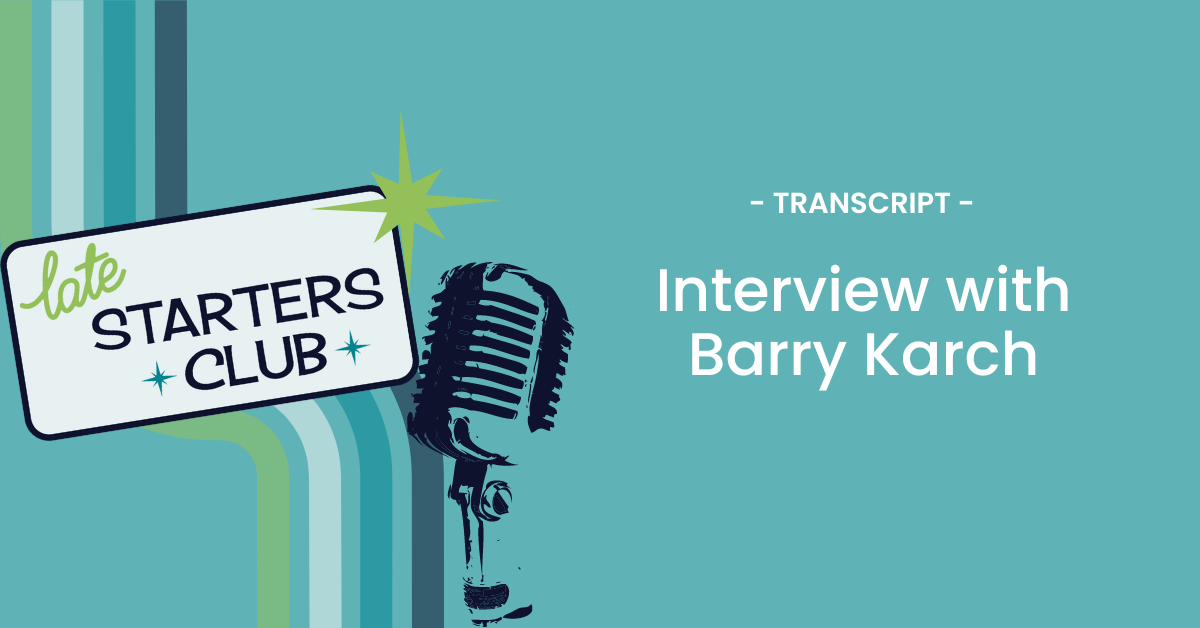
Ep170 Transcript: Finding New Motivation with Barry Karch
Finding New Motivation with Barry Karch Andrea Vahl: It's never too late to restart something you loved. My guest today, Barry Karch, started training for a marathon after a 20 year hiatus. And we'll also dive into how he climbed the equivalent of Mount Everest...
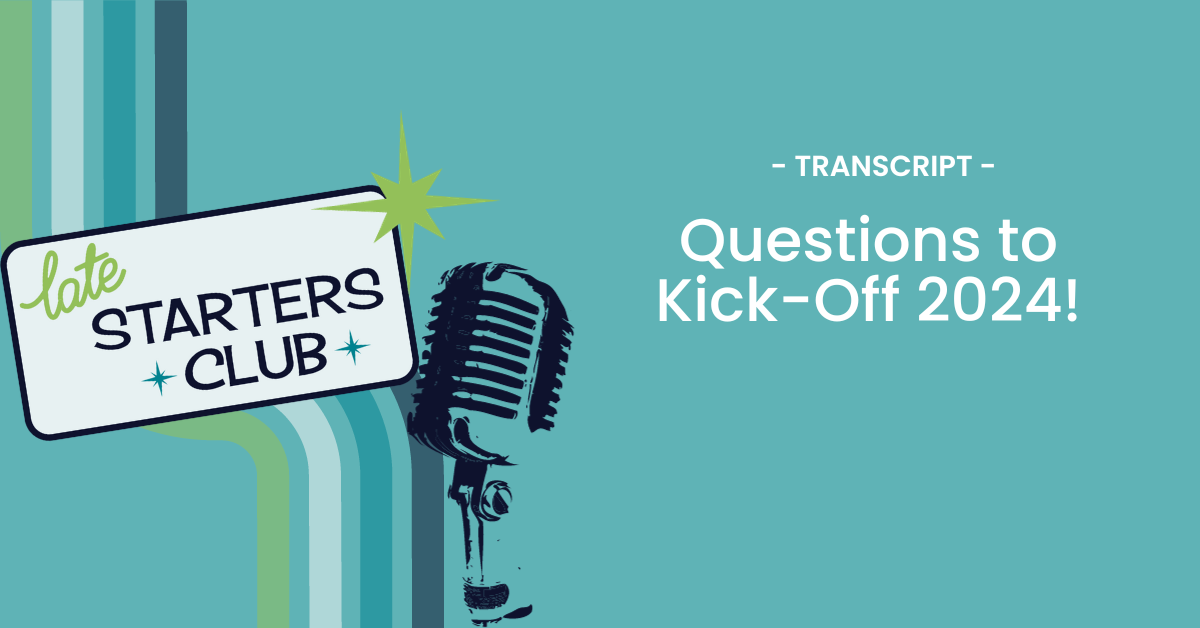
Ep169 Transcript: Questions to Kick Start 2024
Andrea Vahl: Oh, happy new year. Yeehaw. 2024. All right. I don't know about you, but I love planning out my year and setting goals and really reflecting on how my past year went and being super intentional about what I want the next year to look like. In today's...
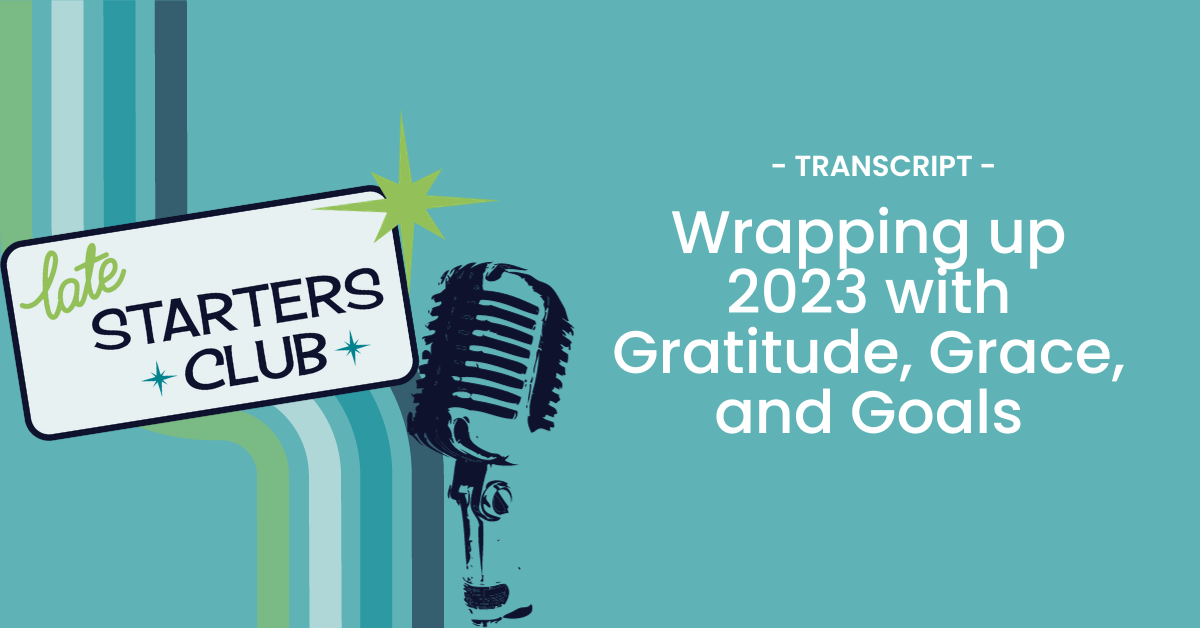
Ep168 Transcript: Wrapping up 2023 with Gratitude, Grace, and Goals
Hello, late starters. It's your host, Andrea Vahl And today is Christmas day. And if you do celebrate that Merry Christmas, if you celebrate some other holiday, I wish you all the best and all the joy for that. I just wanted to make a different episode. So today we're...
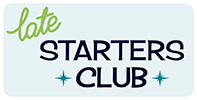
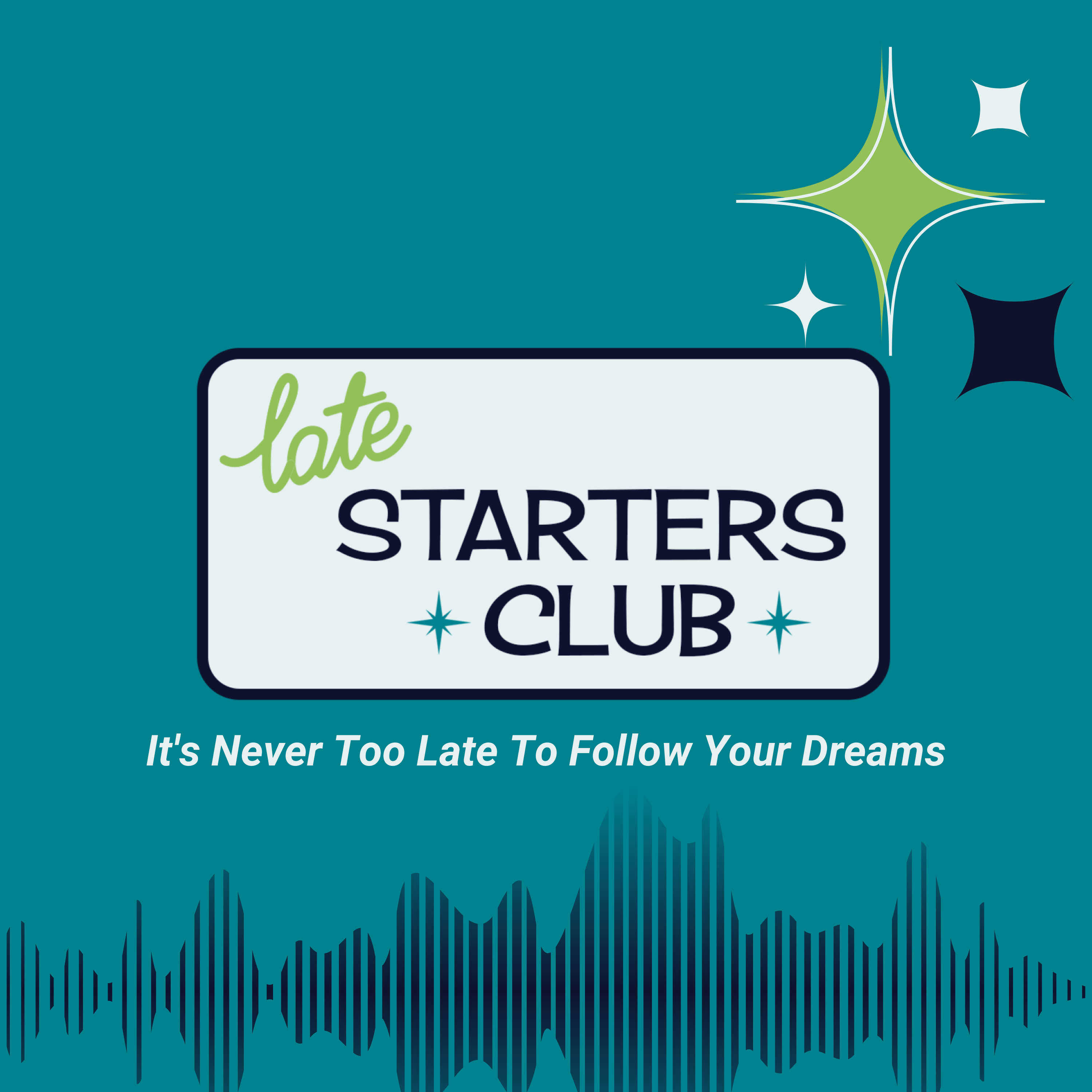
0 Comments